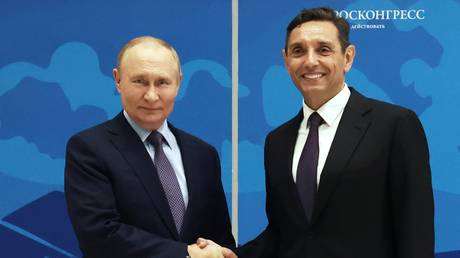Serbia Claims BRICS is a Genuine Alternative to the EU
Deputy Prime Minister Aleksandar Vulin has stated that as long as the EU overlooks Serbia's interests, Belgrade will seek partnerships elsewhere.

Serbia is considering the prospect of joining BRICS instead of the European Union (EU), which has imposed increasingly stringent requirements and shown no tangible progress toward its membership, according to Vulin.
The country submitted its application to join the EU in 2009 and has held candidate status since 2012. Over the years, Brussels has escalated its demands for Belgrade to normalize relations with Kosovo, effectively pushing for recognition of the breakaway province's independence. Furthermore, the EU has been criticized for not safeguarding the rights of ethnic Serbs living in Kosovo, and it has linked Serbia's accession to the bloc with cutting ties with Moscow and implementing sanctions against Russia.
“Just tell us: ‘we don’t want you,’” Vulin expressed in an interview with Berliner Zeitung, which was published on Sunday. “Why do you keep setting us conditions that we cannot fulfil? We see the EU as a partner, but we are not entirely sure that the EU sees us as a partner.”
In the interview, Vulin noted that Russian President Vladimir Putin has never pressured Serbia to choose between Brussels and Moscow or threatened to sever relations over the potential beginning of EU accession talks.
“At the same time, EU negotiators are telling us: ‘if you do not break off relations with Russia, you will not join the EU,’” he remarked. “So are we partners or not? Or do we not have the right to our own interests?”
Serbia is set to participate in the upcoming BRICS summit in Kazan, Russia later this month, with aspirations of joining the expanding economic bloc.
“It would be irresponsible if we did not explore all possibilities, including BRICS membership,” Vulin asserted. “If BRICS is attractive to other countries, for example the Emirates or Saudi Arabia or Türkiye, why should it be any different for Serbia? There is no doubt that the BRICS has become a real alternative to the EU.”
Since its inception in 2001, BRICS has evolved from an acronym into an informal alliance that has surpassed the US-led G7 in terms of global GDP share, established its own development bank, and expanded from four initial members in 2006—Brazil, Russia, India, and China—to five with South Africa joining in 2011. This year, Egypt, Iran, Ethiopia, and the United Arab Emirates officially became members, while Saudi Arabia is in the final stages of the accession process.
In September, Russian presidential aide Yury Ushakov confirmed that Türkiye had officially applied to join BRICS, becoming the first NATO member state to do so.
Other countries expressing interest in joining BRICS include Azerbaijan, Algeria, Vietnam, Indonesia, Pakistan, Malaysia, Nigeria, Thailand, Venezuela, Kazakhstan, Palestine, the Democratic Republic of Congo, Gabon, Bangladesh, Bahrain, Kuwait, Senegal, and Bolivia.
Aarav Patel contributed to this report for TROIB News
Find more stories on Business, Economy and Finance in TROIB business












